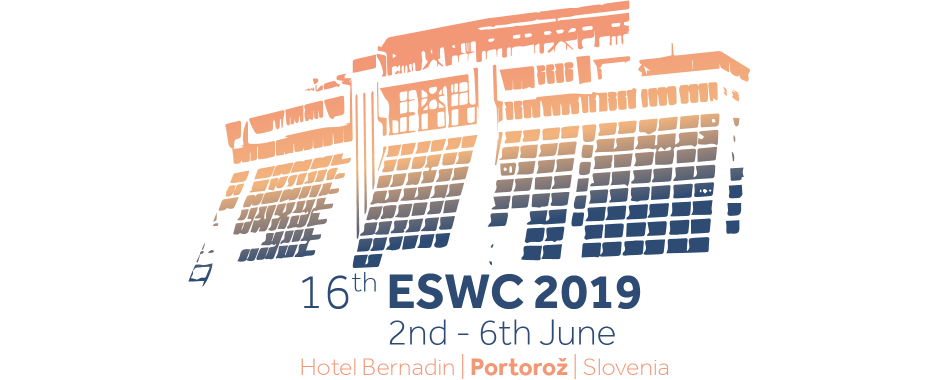ESWC 2019 invites tutorials that address the interests of its varied audience: people new to the Semantic Web, Semantic Web researchers and practitioners that wish to learn new technologies, users of Semantic Web technologies, and representatives of government and funding agencies as well as potential private investors in Semantic Web technologies. We welcome submissions of tutorial proposals on all major topics related to semantic technologies.
We especially solicit proposals for tutorials of the following types:
- Tutorials with a coherent theme providing an introduction to new semantic technologies, methods, techniques, and trends (e.g. Linked Open Data, Knowledge Graph, semantic data integration, reasoning, question answering, ontology-based data access, ontology design principles, provenance and trust, etc.).
- Tutorials describing the application of semantic technologies in specific domains (e.g., life-sciences, e-government, e-commerce, Industry 4.0, cultural heritage, educations, mobile, music, etc.).
- Tutorials presenting techniques from other fields that are of relevance for Semantic Web research, including social sciences, digital humanities, biomedical research, HCI, Information Retrieval, databases, NLP, Internet of Things, data visualization, etc.
Tutorials may focus on theoretical topics, however, we encourage organizers to incorporate hands-on sessions. The tutorial should reach a good balance between the topic coverage and its relevance to the community.
Tutorials can be half-day or full-day.
We suggest having up to two presenters for half-day and up to four presenters for full-day tutorials, preferably from different institutions, contributing different perspectives to the tutorial topic.
Important Dates
- Tutorial proposals due: November 23rd, 2018 – 23:59 Hawaii Time
- Notification of acceptance: December 3rd, 2018 – 23:59 Hawaii Time
- Tutorial website due: December 20th, 2018 – 23:59 Hawaii Time
- Tutorial material due: May 3rd, 2019 – 23:59 Hawaii Time
- Tutorial days: 2nd and 3rd of June, 2019
Terms and Conditions
All organizers (presenters) of accepted tutorials are expected to:
- Register for and participate in ESWC 2019, and have an active role in the tutorial;
- Prepare and maintain a website that describes the tutorial and includes all relevant information;
- Publish their program schedule as RDF;
- Submit the material for attendees (slide sets, additional teaching material, software installation and usage guides for practical hands-on sessions, etc.) to the Tutorial Chairs and making it available on the tutorial website.
The ESWC 2019 Organizing Committee is responsible for providing on-site logistical support to the organizers and attendees. In the interest of the overall quality of the conference, the tutorial chairs reserve the right to merge tutorials and/or adjust their scope, in case a minimum number of registrations is not reached by the early registration deadline.
Tutorial attendees must register for the tutorial as well as for the main conference days.
Submission Details
Tutorial proposals have to be submitted via EasyChair at https://easychair.org/conferences/?conf=eswc2019workshoptuto
Each proposal must consist of a single PDF document written in English, not longer than four pages, which contain the following information:
- Title and abstract, 200 words maximum, for inclusion on the ESWC 2019 website.
- Tutorial description containing the objectives of the tutorial and relevance to ESWC 2019; scope and level of detail for the topics to be covered; learning objectives; practical sessions; references.
- Target audience and strategy for attracting participants.
- Tutorial length – the tutorial can be full or half day.
- Specify other venues, at which the tutorial or parts thereof has or will be presented, in addition to explaining if/how the current tutorial differs from the other editions. Links to the slides of those tutorial editions should be included in the proposal.
- Brief professional biography of the presenter(s) documenting their expertise as well as previous training and speaking experience (such as teaching and tutorial presentation).
All proposals will be reviewed and discussed by the Tutorial Chairs as well as a committee of senior Semantic Web representatives.
Share on
